Metaverse Crypto | 10 Best Metaverse Cryptocurrencies in 2023
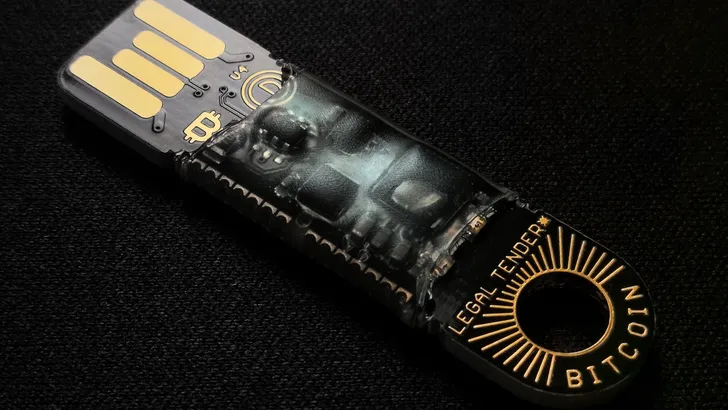
metaverse
rends are often localized, but the internet knows no borders. As such, wherever you are, you’ve probably heard of the “metaverse,” a concept that seems to have become quite the online buzzword.
The metaverse, like many other elements of the blockchain industry, including the value of cryptocurrencies themselves, is a polarizing idea. That said, it’s also a concept that has rocketed to the forefront of today’s zeitgeist, with one of the top social media websites rebranding to jump on the metaverse crypto bandwagon.
So, what is the metaverse, and what cryptocurrencies can you invest in to bring a little metaverse exposure to your portfolio? Read on for all that and more!
What is a Metaverse?
A metaverse, or the metaverse according to some, is a bridge between the real and virtual worlds. It’s often considered the latest iteration of virtual reality and can be accessed with expensive VR gear, but to some, it’s simply an online domain that can be accessed by anyone, providing a shared experience for all.
It’s arguable that the concept of a metaverse is hardly new. Multiplayer games, such as the rabidly popular World of Warcraft that prompted a young Vitalik Buterin to lay the foundation for the Metaverse of today have been doing it for a long time. Second Life, which launched back in 2003, could definitely lay claim to the title as well.
The term metaverse originated in the 1992 sci-fi novel Snow Crash as a portmanteau of ‘meta’ and ‘universe.’ It’s no coincidence that Snow Crash and other Neal Stephenson works are credited with inspiring many blockchain-based projects.
Blockchain is a crucial ingredient for a metaverse. Web2 companies are happy to use the term as part of their marketing mix. Still, the philosophy behind the metaverse lies in decentralized roots, meaning that many only consider decentralized blockchain-based projects to be true metaverses.
Without blockchain and decentralization, Web2 would dominate, as it has already attempted to do with social media Facebook rebranding to Meta Platforms.
This may certainly be one of the reasons why the metaverse gets a bad rap. Ignoring the fact that Mark Zuckerburg settled over stealing the idea for the company itself, Facebook whistleblower Frances Haugen criticized the company’s attitude toward safety.
What Constitutes a Metaverse Coin?
So, firmly eliminating Meta Platforms stock as a vehicle for metaverse investment exposure for both its suitability and the company’s failure in that regard, how can you buy into the metaverse?
The answer, again, lies in blockchain technology and cryptocurrency. Blockchain-based metaverse projects are a category all to themselves, and you can bet on the metaverse by purchasing one of many metaverse cryptos.
However, a quick attempt to search for metaverse crypto coins may well lead you astray. Many unheard-of, pump-today, gone-tomorrow meme coin projects will do the rounds on social media, advertising themselves as metaverse crypto. Many projects that have nothing to do with the metaverse will also do their best to get in on the hype.
Simply put, metaverses open the online world to users, creating immersion and delivering value to all stakeholders, including users and consumers. Gaming projects are a natural fit for this, like any projects that provide some sort of interactive open world. It’s also possible to include projects that innovate and decentralize various industries.
Top Ten Metaverse Cryptos in 2023
Without too much ado, let’s look at some of the top cryptocurrencies that fit the definition of “metaverse cryptos!”
#1. Decentraland (MANA)
Decentraland is a browser-based virtual reality platform that fits the definition of a metaverse all on its own. Users can create player characters called avatars to explore Decentraland as they wish and purchase anything from accessories to land within the virtual world on its marketplace.

The project has come in for significant criticism thanks to a declining user base, but by the same token, it has also seen healthy corporate adoption with a variety of businesses setting up shop within Decentraland. It’s admittedly not as easy on the eyes as the average modern video game, but the project could be considered a successful prototype.
#2. The Sandbox (SAND)
Its own virtual world, The Sandbox, allows users to create and host their own events and experiences with pieces of in-game LAND (also blockchain-based tokens). The Sandbox uses both fungible and non-fungible tokens (NFTs) to their full effect and is considered by many to be blockchain’s answer to games like Roblox or Minecraft.
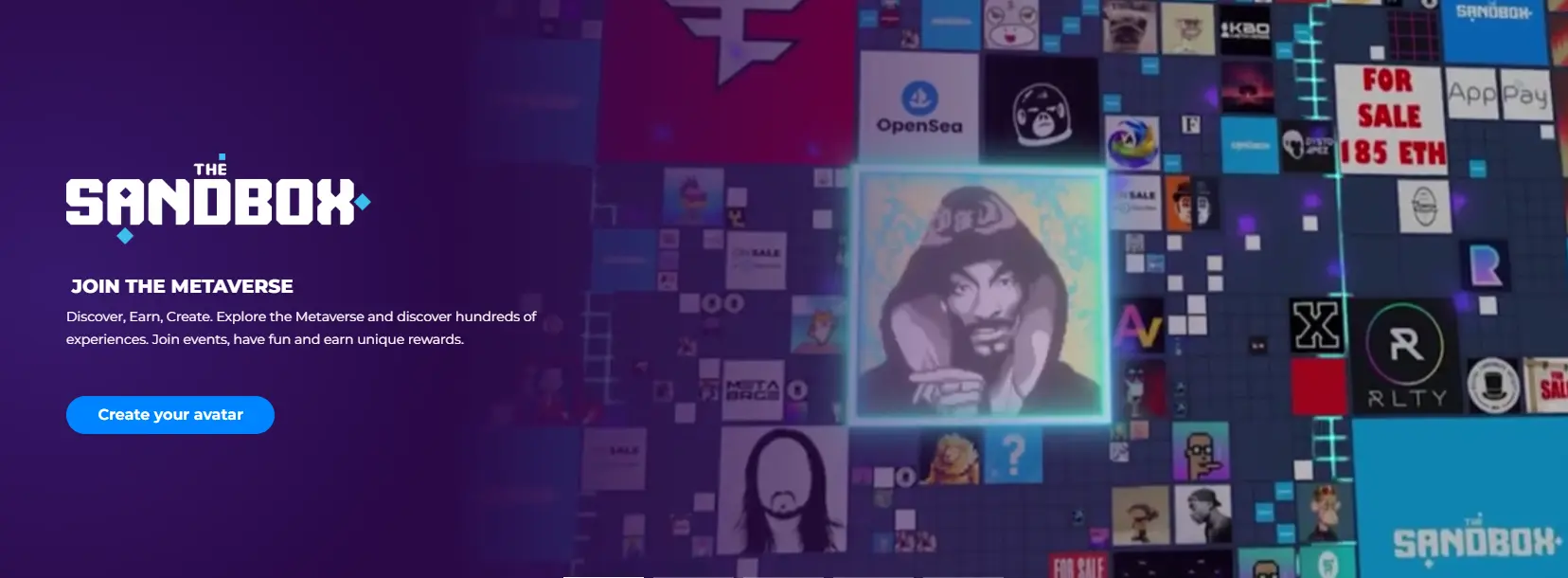
#3. Illuvium (ILV)
The two previous entrants on this list are cutting-edge in terms of function but not form.
Illuvium breaks this trend, providing a gaming experience with AAA quality and serious polish without compromising on the Web3 attitude or benefits of blockchain. Still in beta testing but one of the most highly anticipated projects out there, Illuvium actually offers an interlinked universe, or metaverse, of multiple games.
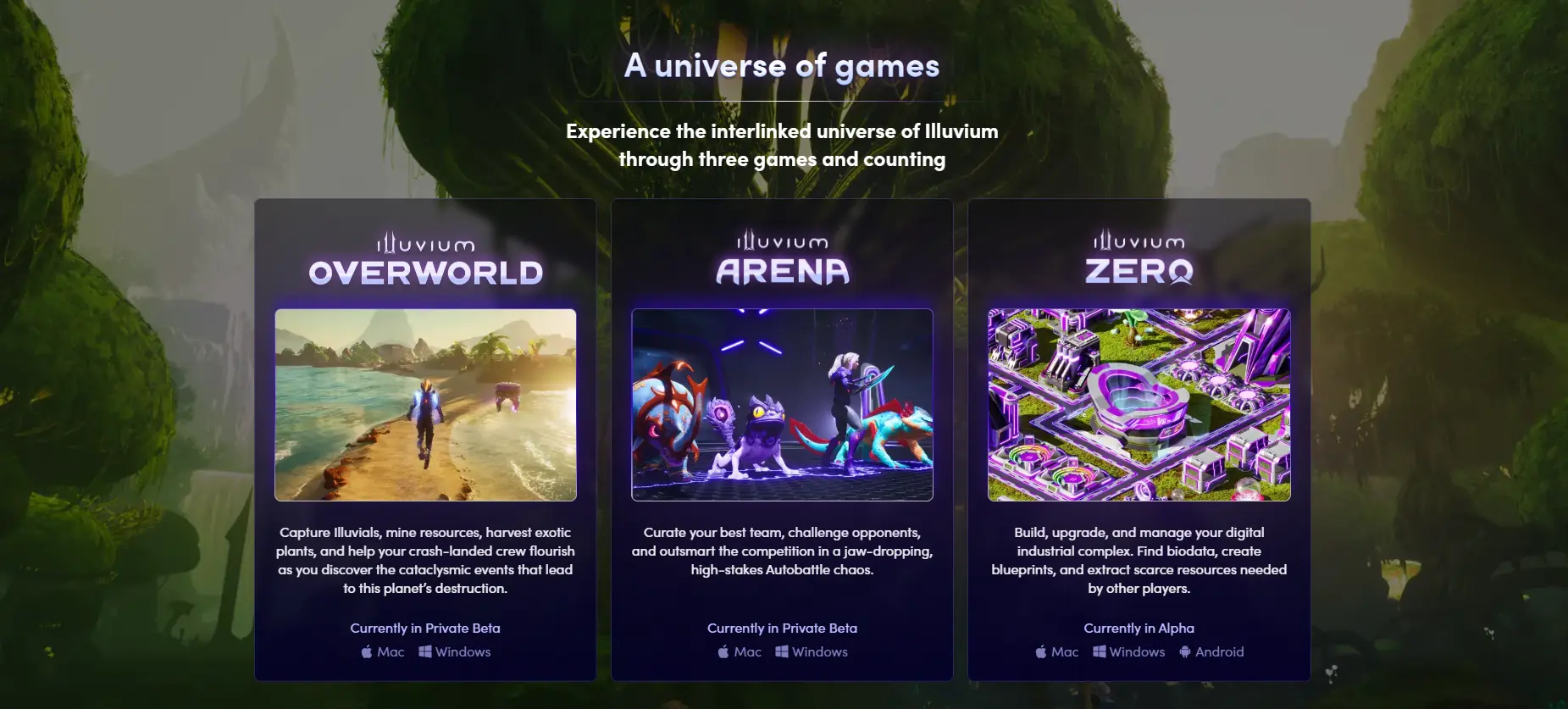
#4. Axie Infinity (AXS)
A trailblazer and game-changer in equal parts, Axie Infinity, showed the world what blockchain can do for the world of gaming.

At its height, people in lower-income nations were turning to Axie Infinity as a way to earn an income simply by playing the game. It also birthed various conventions, such as the scholarship model, where NFT owners rent them out for other players to use.
#5. Enjin Coin (ENJ)
Enjin is a company that provides an entire ecosystem of interconnected, blockchain-based games that arguably form a metaverse when viewed as a whole. One of the top blockchain gaming projects in its own right, Enjin also has serious tech credentials since its co-founder Witek Radomski co-authored the ERC-1155 multi-token standard.
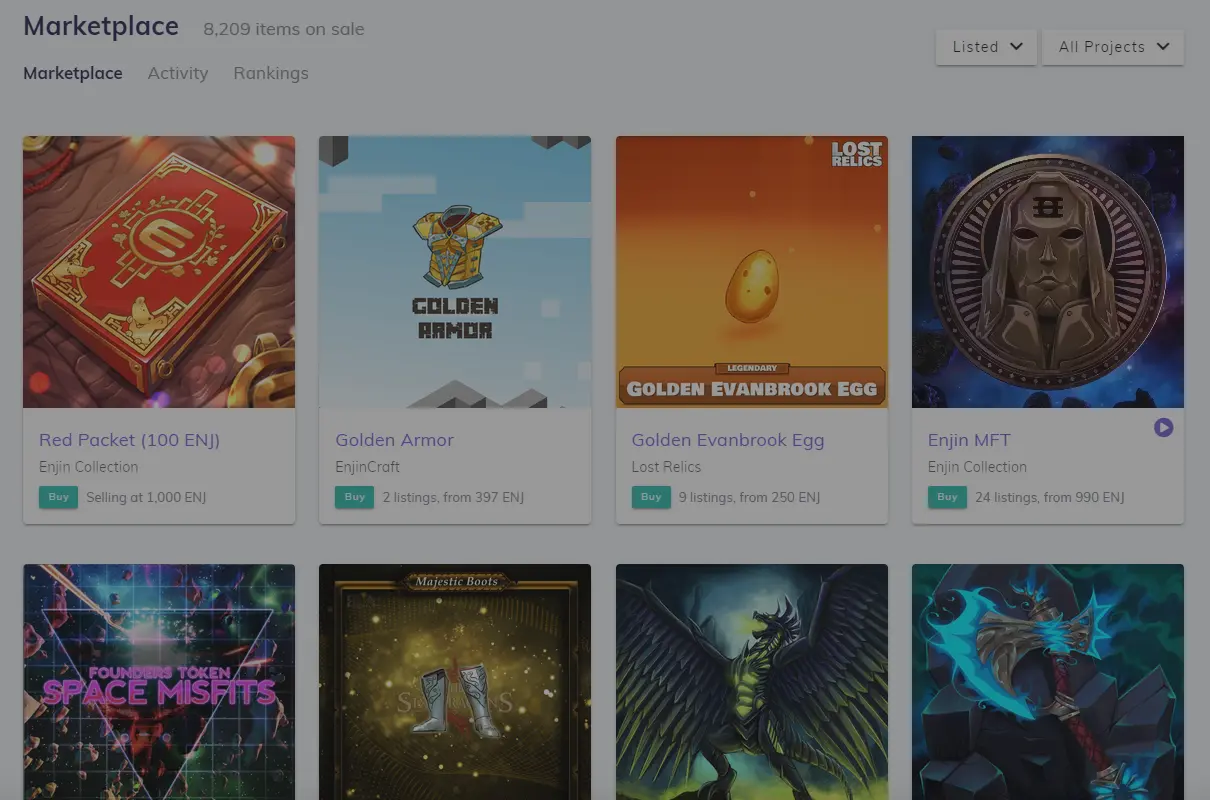
#6. ImmutableX (IMX)
A game studio and provider of a gas-less scaling solution for Ethereum,ImmutableX is fast becoming a dominant name in blockchain gaming and a significant part of the Web3 revolution.
Its popular flagship title, Gods Unchained, is blockchain’s answer to Hearthstone, and the ImmutableX blockchain is consistently among the top 3 in NFT traffic. ImmutableX also has a partnership with retail giant GameStop to bring metaverse and Web3 games to the masses.
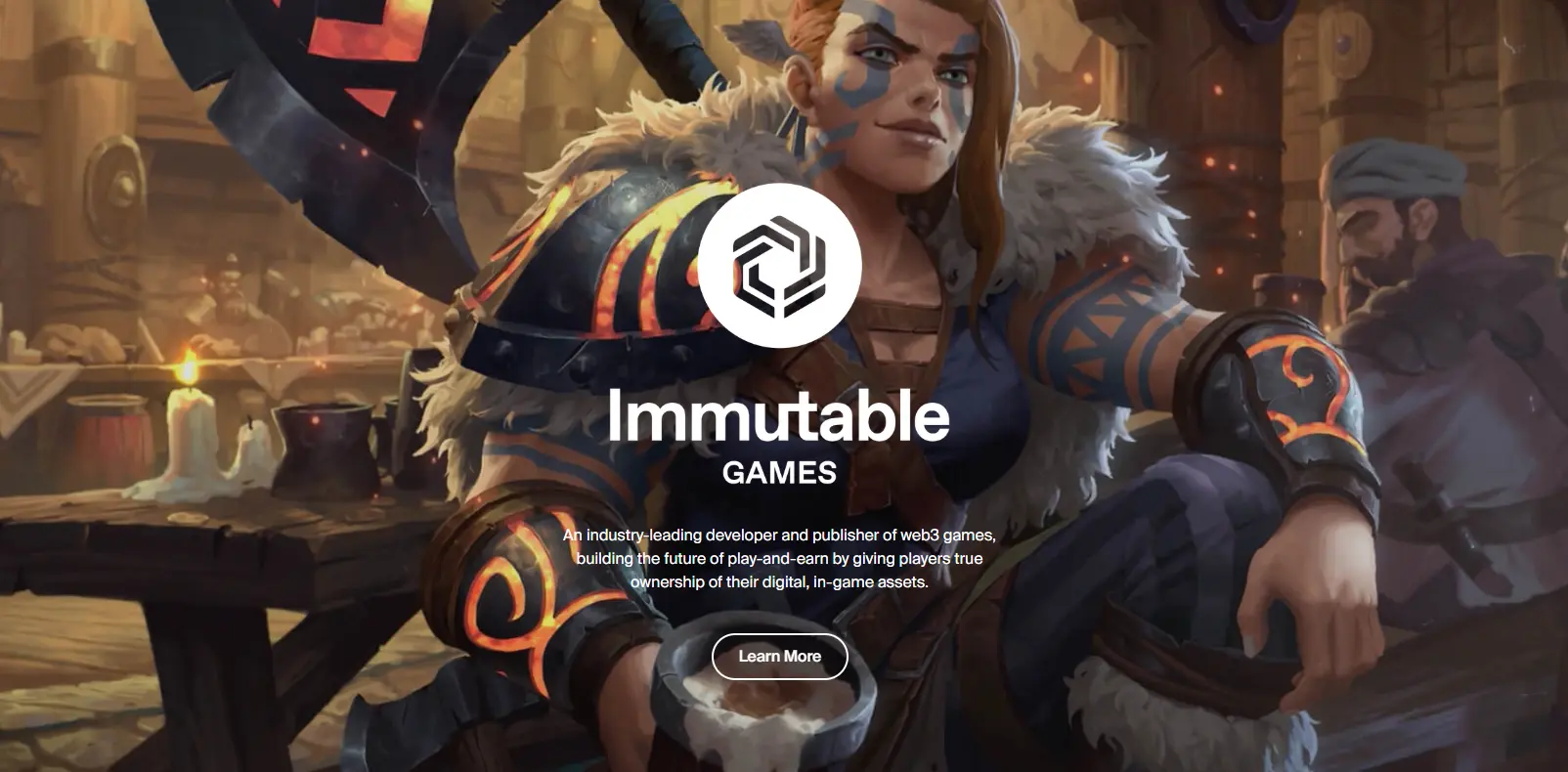
#7. Theta Network (THETA)
Theta is an open-source blockchain platform aiming to decentralize content delivery in the world of video streaming. It allows users to share bandwidth and resources on a peer-to-peer basis, increasing the efficiency of video relay and compensating users for doing so.

Theta isn’t a classic metaverse crypto in the way that Decentraland is, but it is definitely playing a part in the Web3 future of a more open, decentralized internet.
#8. Apecoin (APE)
The governance and utility token of the world-famous APE ecosystem, part of which is the Bored Ape Yacht Club. Many detractors of blockchain and NFT technology, in particular, use the extremely expensive profile pictures of BAYC as a stick to beat the entire industry with, but Apecoin unlocks the ecosystem and provides far more value than merely social media cred.

#9. Ethereum (ETH)
In case you missed it, all of the above cryptocurrencies, with the exception of THETA, are actually ERC-20 tokens. That means that all of the metaverse potential and value they deliver are actually supported by the Ethereum blockchain. For that reason, while Ethereum itself may not be a strictly metaverse crypto, it actually plays a fundamental role in the majority of metaverse projects out there.

#10. Stacks (STX)
On the other hand, if Ethereum somehow proves not to be where it’s at, then Bitcoin may prevail. If this is the case, then Stacks will likely have a part to play. Stacks connects to the Bitcoin blockchain through a mechanism called proof of transfer, and its main goal is to bring Web3 dApps and smart contracts, which include metaverse projects, to Bitcoin.
Honorable Mentions
Despite our having chosen a top ten, there’s a fantastic variety of projects in blockchain right now that are fantastic advertisements for the metaverse. Here’s a list of those that didn’t quite make the cut but are very much worth looking into:
- Gala Games (GALA). A blockchain-based gaming platform very much in the vein of Enjin and ImmutableX, Gala Games was founded by a co-founder of Zynga.
- Render Network (RNDR). Decentralizes and opens up the world of GPU cloud rendering, a must-see if you like the look of Theta Network.
- Mask Network (MASK). A decentralized Web3 layer that sits atop Web2 social media platforms, bringing an element of security to your social media interactions.
- FLOKI. A memecoin through and through, but worth a mention because of its focus on utility rather than hype and elements such as the University of Floki.
- Treasure (MAGIC). A decentralized video game console using the MAGIC token, Treasure brings games and communities together.
- Wax (WAXP). One of the top NFT-focused blockchains, Wax is easy to use and extremely fast, delivering a token-based economy operating on consumer resources.
- Gods Unchained (GODS). If Axie Infinity and The Sandbox are blockchain’s answers to Pokémon and Minecraft, respectively, then Gods Unchained is a decentralized, player-owned Hearthstone or Magic: The Gathering.
Is the Metaverse a Fad?
Given Meta Platforms’ failure to achieve anything akin to a working model of a metaverse despite billions of dollars’ worth of investment, the metaverse appears to be a tough nut to crack.
In fact, senior vice president of Intel Raja Koduri was quoted saying that: “Truly persistent and immersive computing, at scale and accessible by billions of humans in real-time, will require…a 1,000-times increase in computational efficiency from today’s state of the art.”
For this reason, it’s perhaps unfair to write off the prototypes of today, such as Decentraland, simply for failing to look good enough if the hardware of the day can’t sustain anything more.
That said, the internet and the online world are a source of practically unlimited income for some of today’s richest tech titans. They’re not about to let go without deploying every weapon in their arsenal, which may be why the corporate media tries its best to assure you that Web3 and the metaverse are dead and buried.
Should You Buy a Metaverse Coin?
Generally speaking, you should only ever invest in something if you believe in it. The investment culture of hedging bets says otherwise, but you probably shouldn’t load up on metaverse cryptos if you don’t believe they have a future.
On the other hand, if you think that the metaverse will form part and parcel of the online landscape of tomorrow, then it might be a good idea to get in early. Some cryptocurrencies backing metaverse projects could certainly explode in value over the long term if their vision bears fruit.
To help you decide whether you should add a metaverse crypto to your portfolio, let’s take a look at some of the most clear-cut pros and cons:
Benefits of Metaverses
- Remote communication. As the coronavirus pandemic brought an entirely new reality to many households worldwide, one of the main lessons learned was that remote communication, including remote work and learning, can not only be feasible but effective. Metaverses could take this to the next level, making remote communication more immersive, and richer and even adding elements such as gamification to enhance effectiveness.
- Powered by blockchain. While blockchain technology isn’t strictly necessary for what many people visualize as a metaverse, it brings crucial decentralization and fair compensation to the table. For instance, in blockchain gaming, players can truly own their in-game assets thanks to NFT technology.
- Virtual real estate. As can already be seen in metaverses such as Decentraland and The Sandbox, corporations can play as big a part as they want by availing users of in-metaverse services. Since brands are happy to pay for user attention across many forms of media, metaverses offer yet more advertising space.
- Virtual economy. As Axie Infinity has shown, gamers can earn an income by playing games if there’s compensation and true asset ownership involved. Therefore, metaverses could be an extremely fertile ground for job creation or simply creative expression.
Disadvantages of Metaverses
- Privacy/security. As a relatively unexplored online domain, metaverses entail more than their fair share of privacy and security risks. Blockchain technology can invalidate some of them by allowing sign-ins requiring only a wallet and no personal data, but it’s a wide area.
- Technology requirements. As previously mentioned, today’s state-of-the-art technology may not be enough to provide the levels required for a truly immersive metaverse. While this certainly will change, you must not underestimate the ability of hardware manufacturers to gatekeep via price tags.
- VR dominance. You’ve probably seen “The Matrix” or scrolled through the memes about what a Facebook-led metaverse would look like. A reality where users withdraw from the real world and prioritize the virtual one may seem laughable now, but the evolution of the internet into an untouchable part of our daily lives does suggest that the lines will continue to blur as time inevitably marches on.
How to Buy a Metaverse Crypto Coin
Buying metaverse crypto isn’t too different from buying any other cryptocurrency. For the most part, you’re going to need three things—currency to buy the metaverse coin with, a way to buy it, and a crypto wallet to store it in.
Given that most metaverse cryptos are Ethereum-based tokens and many metaverse projects use the Ethereum blockchain, one of the best ways to start is to acquire an Ethereum-compatible wallet. Many people choose MetaMask since it’s an easy-to-use, versatile wallet, but alternatives like the GameStop Wallet are perfectly fine as well.
Once you set up your wallet, you’ll need to figure out where you want to buy your metaverse cryptos. If they’re ERC-20 tokens, you can buy them on Ethereum-based decentralized exchanges (DEX) such as Uniswap. You may also find metaverse cryptos listed on major crypto exchanges.
Figuring out whether you want to use a DEX or centralized exchange is a big step because the latter generally means you need to register for an account. That could take a while! It also means that you can buy crypto directly with fiat, although many good Ethereum wallets also have integrated on-ramps to buy ETH with fiat.
Having ETH in your wallet is important since you’ll need it to buy crypto on a DEX. Luckily, DEXs are generally easy to use. Just get onto the website, double-check that it’s the right one, and then connect your wallet. From there, you can simply navigate to the Swap interface and swap your ETH for the metaverse crypto you want.
Key Takeaways
Metaverse has become an extremely popular buzzword and has polarized opinions in much the same way as NFTs previously. However, metaverses have been around in one form or another, with various multiplayer games and platforms like Second Life widely considered to be metaverses themselves.
Blockchain technology is a crucial ingredient in the recipe of a metaverse, both in the way it’s currently understood and going back to the original ideology behind the word. Decentralization is being fought tooth and nail by monopolistic organizations, which, by controlling access and value, have swelled their own worth to trillions.
Thankfully, investing in blockchain-powered metaverse cryptocurrencies is easy. Ethereum forms the foundation for many metaverse projects, so Ethereum DEX platforms are the best way to do it, but non-Ethereum tokens can also be acquired easily on blockchain-native DEXs. CEX platforms also sell metaverse cryptos, but you’ll have to search a bit to see which ones are listed.
Crypto Metaverse FAQ
What are the best metaverse crypto projects?
The best metaverse crypto projects may differ from person to person depending on taste, but they include projects like Decentraland, The Sandbox, Enjin, ImmutableX, and the others on our list above.
What’s the price of a metaverse crypto?
That depends on the supply of tokens for the individual project, its popularity, and prevailing market conditions. For instance, Illuvium’s ILV token has an all-time high of over $1,000. At that time, not only was the crypto market in the midst of a historic bull run, but the token also had a very low supply, even lower than that of Bitcoin.
Are there metaverse crypto games?
Absolutely. Games are one of the best ways to express the concept of a metaverse, so several projects have built out richly featured games. Many games are also being developed to be interoperable with others, letting players own their items outright and use them across multiple games.
What’s the meaning of metaverse crypto?
Metaverse crypto can refer to the cryptocurrency, either a coin or token, used by a project attempting to build out a metaverse or part of one.
Where can you buy metaverse cryptos?
You can buy metaverse cryptos on a variety of decentralized exchanges as well as some centralized exchanges. Take a look at the token’s page on Cryptomarketcap for a list of available markets for the coin or token.